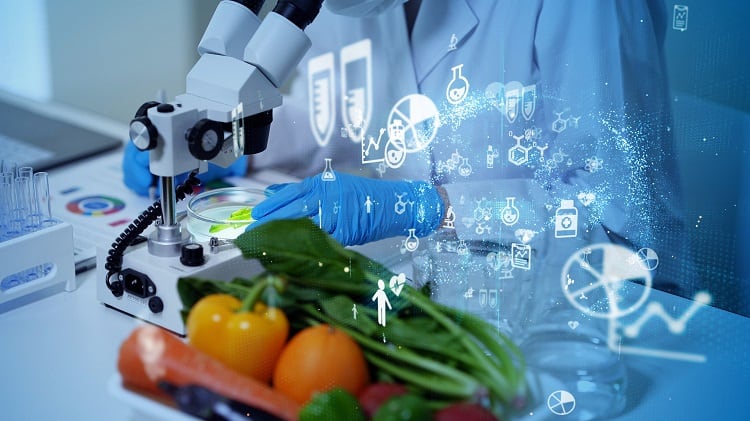Italy made headlines recently when the new government revealed proposals to ban the production and marketing of so-called ‘synthetic foods’ including lab-made meat, fish and milk, and possibly insect-based protein too.
We’re obviously a long way from these types of products being widely available on the mass market. But tellingly, if passed, the law would make Italy the first and only country to impose such a ban. The plans were swiftly criticised as being anti-innovation, anti-consumer choice and anti-environment. An article in Time magazine described the proposals as ‘gastro-nationalist sop’ designed to appeal to the agricultural vote in what is a famously food-obsessed country.
But the headlines mask Italy’s attempts to take the lead in technological innovation in the agri-food sector, not just locally but also globally.
According to the Smart AgriFood Observatory, the Italian market of Agriculture 4.0, or digital agriculture, was worth approximately EUR 2.1 billion in 2022, representing growth of 31% over the previous year. And while global investment in all sectors fell by over 24% in this period, according to Dealroom data, investment in agrifood sector has only decreased by 20%, which is lower than the average global decrease. Also, we can see that investor interest in European markets has not declined, as demonstrated by the 9% growth in agrifood tech in Spain in 2022.
Italy's agrifood tech sector’s most recent boost came with the launch of the Verona Agri Food Innovation Hub.
This will integrate the activity of FoodSeed, the national agri-food tech programme in Italy, financed with over 15 million euros and recently launched in partnership with Eatable Adventures, one of the top three food-tech accelerators in the world.
The hub’s purpose is to ‘stimulate a culture of innovation in the agri-food sector and establish a strong, sustainable entrepreneurial ecosystem’.
The initiative aims to become the strategic hub for the development of agrifood in Italy, serving as a critical meeting point for entrepreneurs, experts, and researchers to exchange ideas and collaborate on the latest advances in the industry, ‘essential in light of the unprecedented challenges posed by the current international context and the climate crisis’.
The achievement represents “a significant milestone for the Verona ecosystem, the development of venture capital, and for its role as an enabler in the technological innovation of production chains," said Economy and Finance Minister Giancarlo Giorgetti in the message sent to the event. “Start-ups are key drivers for transformation and modernization processes within mature economies like Italy's”.
Further, the hub aims to foster entrepreneurship in the agri-food sector, creating ‘high-quality employment opportunities and driving sustainable, long-term growth’ and ‘contribute to enhancing the competitiveness of the Italian industry’.
The initiative is supported by a broad partnership of public and private players including Italian bank UniCredit and the General Confederation of Italian Industry, Confindustria. “Italy has always been synonymous with gastronomic excellence and innovation in the food industry, which grows and expands globally every year,” José Luis Cabañero, founder and CEO at Eatable Adventures, which will operationally manage the hub’s structure, told FoodNavigator.

In 2022, the entire Italian agri-food chain was a driving force for the growth and development of the country, with an economic value of 538 billion euros. The Italian agri-food system represents 25% of the national GDP, more than 23% of national exports, with a projected annual value of 50 billion, and employs 4 billion workers in the supply chain.
The Verona Agrifood Innovation Hub boasts a commitment ‘to promote and disseminate knowledge of the most advanced solutions in the agri-food sector’.
Which solutions are most needed in Italy and what benefits will they bring?
The Italian food system is under similar pressures to those faced by other European countries, explained Cabañero. “The effects of climate change, along with the inflation triggered by the conflict in Ukraine and the ongoing energy crisis, are among the leading factors that have worsened the existing pressure on the entire production system,” he said. “As a result, there has been a push to accelerate research into innovative solutions applied throughout the agri-food supply chain.”
Undoubtedly, one of the primary challenges for Italy is to find effective technological solutions to mitigate the effects of drought in agriculture, he explained. Italy, along with France, Spain, and Germany, is one of the driest countries in Europe. According to data from the Institute of Atmospheric Sciences and Climate, Italy experienced its warmest year since 1800 in 2022. Meanwhile, precipitation levels were 30% below the 30-year average from 1990 to 2020. This deficit rose to 40% for the North. “This has had devastating consequences for agriculture and natural habitats,” lamented Cabañero. “In the Po Valley, crops such as barley, wheat, and clover sown in autumn 2021 began growing in late winter due to unusually mild temperatures, but were compromised by water scarcity. The already-sown grain has seen one of the worst yields in recent years due to the lack of water and the sudden and early rise in temperatures.”
The drought has also caused a loss of energy production, particularly from hydroelectric sources, which have decreased by 41% due to low precipitation levels.
In this context, solutions oriented towards more efficient use of water resources, such as digitalization of fields, vertical and indoor farming, and artificial intelligence, are critical to ensure the sustainability of the Italian food system in the face of climate change, Cabañero told us. “In addition to water management, there is a need for the Italian industry to focus on improving productivity and efficiency while reducing environmental impact,” he said. “This can be achieved through the reduction of waste, the use of low-impact packaging, and the adoption of business models that promote eco-friendly practices, among others.”
Italian consumers, meanwhile, are increasingly concerned about the sustainability and health benefits of the food they consume, aligning with European trends. “There is a growing interest in promoting new solutions that provide health benefits through food and new ingredients that enable clean labels or products with better nutritional profiles,” Cabañero observed. “The adoption of these solutions not only benefits the environment and consumer health but also creates opportunities for Italian businesses to differentiate themselves in the global market. Therefore, investing in innovation and sustainability in the food sector is not only necessary but also economically beneficial.”
According to Minister Giorgetti, "the strength of the agri-food sector is a source of pride, but it is important to always look for ways to take a step forward, and this is where the propulsive effect of new companies and innovations can add value: Verona, one of the leading industrial areas in Europe, can serve as a model to be emulated, thanks to an ecosystem that is poised to embrace the opportunities that are being built”.

Italy – suffering from problems such as a shrinking population and high youth unemployment – cannot miss the opportunity to strengthen its international competitiveness by developing excellence and innovation in the food industry with more effective and sustainable models, agreed Cabañero.
“Our focus is on relaunching the sustainable growth of the agri-food sector while respecting ethical principles and enhancing the excellence of the Italian supply chain in the face of unprecedented challenges posed by the current international context and the climate crisis,” he said.
“It is crucial not only to provide financial incentives for innovative projects through the creation of investment vehicles that support the development of these proposals, but also to support and guide start-ups through targeted education and training programs aimed at understanding market needs and equipping them with the necessary knowledge to offer effective solutions. Additionally, it's essential to foster connections between start-ups and other key players in the industry, including research centres, universities, and companies. By bringing together these different groups, we can create a thriving ecosystem that will support the growth and success of innovative start-ups.”
Investment is ‘more necessary than ever’ in agrifood tech
The application of new technologies is a ‘unique opportunity’ to address sustainability and efficiency challenges, stressed Cabañero.
“Italy is currently focusing on laying the foundation for a competitive agri-food tech ecosystem and must prioritize tackling more pressing and current challenges such as the substantial decrease in agricultural production due to the widespread drought, the energy costs and work towards the reduction of food waste.
“The challenge is enormous. We have observed the increasing interest of the Italian food industry in finding new, sustainable, and efficient production models and how the entrepreneurial ecosystem has the potential to facilitate these solutions. The industry needs the necessary tools to do so. With FoodSeed, we have been able to see this reality first hand and confirm the tremendous interest demonstrated by Italian start-ups. We received a surprising response after the call, far exceeding our expectations.
“Our mission in Eatable Adventures is to facilitate the development of innovative proposals that provide solutions to these challenges, fostering the competitiveness of the sector on an international level and promoting entrepreneurship in this field.”




